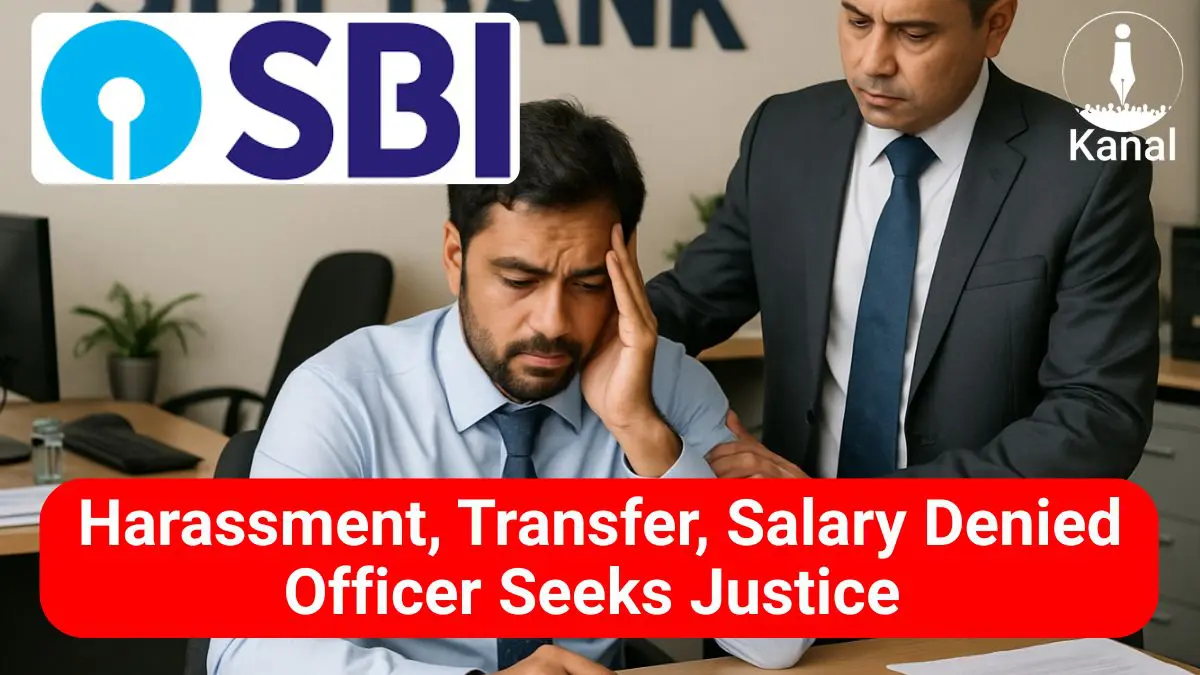New Delhi: A senior officer of the State Bank of India (SBI) claims to have faced harassment, wage withholding, and retaliatory transfers over the past eleven months. Vikas Soni, who has been with SBI for 18 years, highlights serious concerns regarding employee rights and ineffective human resource practices in India’s largest public sector bank. His situation raises critical questions about workplace culture and employee treatment within the financial industry.
The Ordeal of Vikas Soni
Vikas Soni, a Chief Manager under the Retail Business Operations in Akola, Maharashtra, has recently come forward with grave allegations against the State Bank of India (SBI). Citing severe workplace harassment, salary stoppage, and retaliatory transfers, Soni’s disturbing narrative unfolds a dismal picture of employee rights being sidelined at one of India’s most significant public sector banks. For over 18 months, Soni has been part of SBI’s commendable workforce but claims to have been subjected to relentless mistreatment despite outstanding service records.
Despite continuing his duties, Vikas’s salary and allowances have been withheld for over eleven months. “No salary slips were issued, no medical bills reimbursed, no house rental or dependent allowances cleared,” he noted in his correspondence to SBI’s top management. This money deprivation has not only affected his financial standing but also severely impacted his health and that of his family, raising critical questions about employee welfare in the banking sector.
Impacts on Health and Family Life
The intercepts from Vikas Soni’s letters reveal a profound impact on his mental and physical health. “Continuous harassment, chosen silence on communications, and coercive transfers have left me and my family in turmoil,” he expressed. This alarming narrative showcases the dire implications that prolonged salary withholding can have on an employee’s well-being, underlining the need for a supportive work environment, especially in a demanding industry like banking.
Imagine a father trying to provide for his family while facing unimaginable stress due to financial instability; this is the reality for many employees like Vikas. His responsibility to provide has not diminished, creating a compounded stress on his mental health as he struggles to navigate through this professional quagmire. With basic needs unfulfilled, the family is left to cope without essential sustenance, as financial security remains a distant dream.
| Key Issues Faced by Vikas Soni | Description |
|---|---|
| Salary Withholding | Over 11 months without salary, leading to financial distress. |
| Medical Neglect | No reimbursement for medical expenses; health suffers. |
| Retaliatory Transfers | Abrupt transfer to a remote branch deemed punishment. |
| Emotional Impact | Severe stress affecting family due to financial instability. |
Allegations of HR Failures
Vikas’s situation spotlights systemic issues within SBI’s human resources practices. Instead of addressing legitimate grievances, allegations of mistreatment seem to be met with threats and abrupt transfer orders. He was moved to a lower-scale branch in Aheri, Gadchiroli, which is considered as a “punishment posting”, indicative of a deeply flawed HR strategy that discourages employees from voicing concerns. “This abrupt transfer feels like an attempt to silence me,” he mentioned, emphasizing the culture of fear that many employees face.
Moreover, the banking sector is known for its rigorous working conditions, and the fear of non-compliance leading to retaliation compounds the problem. Employees, under such stress, may hesitate to bring rightful grievances forward, thus fostering a toxic work environment. Vikas’s ordeal is not merely a personal battle but a clarion call about the broader systemic issues affecting a significant number of employees within public sector banks.
Constitutional Rights and Legal Battles
Vikas Soni’s insistence on invoking constitutional rights further accentuates the gravity of his situation. In his letters, he references critical articles from the Constitution of India, including Article 21 (Right to Life and Livelihood), Article 23 (Prohibition of Forced Labour), and Article 300A (Right to Property). His request for legal intervention has remained unheard, privation not just of remuneration, but of basic human dignity. He pointed out, “Begar, or forced labour, cannot be imposed by withholding rightful remuneration,” underscoring his plight as a violation of essential rights.
A Call for Justice
In closing, Vikas Soni has not only been a victim of a systemic failure but has emerged as a beacon of hope for others in similar situations. He implores top executives to allow for judicial and labor authority intervention to rectify his situation and prevent such injustices from recurring. “I cannot accept this injustice. Justice is available for all, irrespective of any discrimination,” he passionately states.
While Vikas’s plight remains unresolved and formal responses from SBI management are still pending, his case highlights a critical juncture in addressing larger issues of accountability within public sector institutions. As the banking sector continues to face intricate challenges, establishing a robust framework for employee welfare and protection is paramount.
Bankerpedia’s Insight 💡
The distressing case of Vikas Soni at SBI underscores critical gaps in employee welfare within India’s banking sector. As the nation’s largest public sector bank, SBI’s handling of harassment and wage disputes jeopardizes not just employee morale but erodes public trust in financial institutions. This situation raises alarm bells about systemic flaws in HR practices, which can profoundly impact employee welfare and productivity. For those in finance, it’s essential to advocate for transparent grievance mechanisms. This case highlights the urgent need for a culture of accountability to protect employee rights and dignity.
How Does This Affect the Banking Ecosystem? 🏦
- Bank Employees → Increased anxiety over job security and employee rights violations.
- Bank Management → Increased scrutiny on HR practices and employee rights.
- Bank Customers → Increased anxiety over financial security and employee rights.
- Investors / Shareholders → Concerns over employee treatment may impact bank reputation negatively.
- Regulators (RBI, SEBI, Govt.) → Increased scrutiny on HR practices and employee rights compliance.
- General Public → Concerns over employee rights and workplace conditions rise.
Research References 📚
Loved our Research? ❤️
Bankerpedia turns financial confusion into clarity!
Subscribe to our YouTube channel for unbiased insights, financial literacy & practical banking wisdom.










